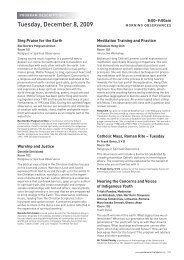Whispers and Vanities in Samoan Indigenous Religious Culture
Whispers and Vanities in Samoan Indigenous Religious Culture
Whispers and Vanities in Samoan Indigenous Religious Culture
Create successful ePaper yourself
Turn your PDF publications into a flip-book with our unique Google optimized e-Paper software.
olster or susta<strong>in</strong> the chief’s status <strong>in</strong> the village. For the naiufi it is believed that they<br />
are a special gift, a direct endowment from Tagaloa. This is evidenced <strong>in</strong> the<br />
honorific term for sacred fish, which is tamasoaalii (tama soa mean<strong>in</strong>g “aide to”; alii<br />
mean<strong>in</strong>g “chief”): God Tagaloa’s gift was for these sacred fish to become aide to the<br />
chief. This affords these sacred fish special status <strong>and</strong> entitles them to the rituals of<br />
respect befitt<strong>in</strong>g a person of paramount importance. In this sense, when fishermen<br />
speak to the naiufi <strong>in</strong> chiefly language, his special status as tamasoaalii is<br />
acknowledged. The naiufi are thus considered more than just food.<br />
The custodian expla<strong>in</strong>s that when Pupu Luki <strong>and</strong> his companion went out to fish for<br />
naiufi they would leave late at night, about 11pm, <strong>and</strong> proceed to the reef, then out to<br />
the deep ocean. They would use a shark rattle (an ensemble of coconut shells tied to<br />
an orange tree stick) to let the shark know where they were. After row<strong>in</strong>g for about<br />
an hour <strong>in</strong> deep ocean waters Pupu Luki would put the rattle <strong>in</strong>to the water <strong>and</strong> twist it<br />
around to make a sound similar to that of a mov<strong>in</strong>g bonito. And while rattl<strong>in</strong>g he<br />
would chant:<br />
Afio maia oe le manaia<br />
Welcome to you the manaia – the head of the untitled men’s guild<br />
Afio maia oe le tausala<br />
Welcome to you the tausala – the belle of the ladies’ guild<br />
Afio maia oe le tamasoaalii<br />
Welcome to you the tamasoaalii<br />
O loo ou faatali atu<br />
I await your com<strong>in</strong>g<br />
Pupu Luki believed that the shark was his equal. He believed that they shared a<br />
common descent <strong>and</strong> dest<strong>in</strong>y <strong>and</strong> that the shark understood this. This belief is<br />
captured <strong>in</strong> the way that he spoke <strong>and</strong> acted towards the fish. The fish was welcomed<br />
as a manaia or tausala, who as the head <strong>and</strong> usually f<strong>in</strong>est of the aumaga (untitled<br />
men’s guild) or aualuma (ladies’ guild) is afforded high respect.<br />
As the shark approaches Pupu Luki addresses him <strong>in</strong> chiefly language, say<strong>in</strong>g<br />
sooth<strong>in</strong>gly:<br />
Afio maia ua manaia le ele o le savili i lou seesee mai<br />
Welcome! The blow<strong>in</strong>g of the w<strong>in</strong>d improves by your com<strong>in</strong>g<br />
But the shark circles the canoe <strong>and</strong> leaves. Pupu Luki turns to his companion to make<br />
sure that he is not afraid. His companion, on see<strong>in</strong>g how big the shark is <strong>and</strong> how<br />
small their boat seems cannot help but be afraid. Pupu knows that the shark can sense<br />
this <strong>and</strong> so is not surprised that the shark turned away. He tells his companion to be<br />
brave as the fish can sense fear. Pupu then addresses the shark aga<strong>in</strong>:<br />
Ua mae’a ona laolao le va o a’u ma le soa<br />
Afio maia oe le manaia<br />
Afio maia oe le tausala<br />
E le vale sou tali<br />
O le a ou faatali atu!<br />
7











